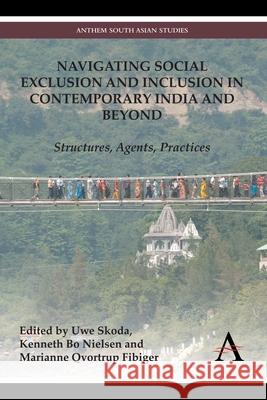Navigating Social Exclusion and Inclusion in Contemporary India and Beyond: Structures, Agents, Practices » książka
Navigating Social Exclusion and Inclusion in Contemporary India and Beyond: Structures, Agents, Practices
ISBN-13: 9781783083404 / Angielski / Miękka / 2014 / 238 str.
Navigating Social Exclusion and Inclusion in Contemporary India and Beyond: Structures, Agents, Practices
ISBN-13: 9781783083404 / Angielski / Miękka / 2014 / 238 str.
(netto: 122,75 VAT: 5%)
Najniższa cena z 30 dni: 127,05
ok. 30 dni roboczych.
Darmowa dostawa!
'Navigating Social Exclusion and Inclusion in Contemporary India and Beyond' examines the applicability of the concept of social exclusion in contemporary India, and addresses the following questions: How does an increasingly liberalised Indian economy contribute to processes of social inclusion and exclusion and to the reproduction of poverty and inequality? To what extent does the deepening of Indian democracy offer hitherto marginalised social groups new opportunities for pursuing strategies of inclusion? And how does 'development' alter the social terrain on which inequalities are negotiated? These and related discussions form the focal points of the volume. Importantly, the contributors deal explicitly with the simultaneity of processes of exclusion and inclusion, and with their entangled manifestation in social life. By applying the concept of social exclusion to concrete empirical case studies, the contributors expand conceptual horizons by keeping in mind that neither exclusion nor inclusion can be considered without its 'alter ego'. The volume also challenges narrow conceptualisations of social inclusion and exclusion in terms of singular factors such as caste, policy or the economy. This collaborative endeavour and cross-disciplinary approach, which brings together younger and more established scholars, facilitates a deeper understanding of complex social and political processes in contemporary India.
Navigating Social Exclusion and Inclusion in Contemporary India and Beyond contains a collection of lucid, empirically grounded articles that explore and analyse the structures, agents and practices of social inclusion and exclusion in contemporary India and beyond. The volume combines a broad range of approaches to challenge narrow conceptualisations of social inclusion and exclusion in terms of singular factors such as caste, policy or the economy. This collaborative endeavour and cross-disciplinary approach, which brings together younger and more established scholars, facilitates a deeper understanding of complex social and political processes in contemporary India.











